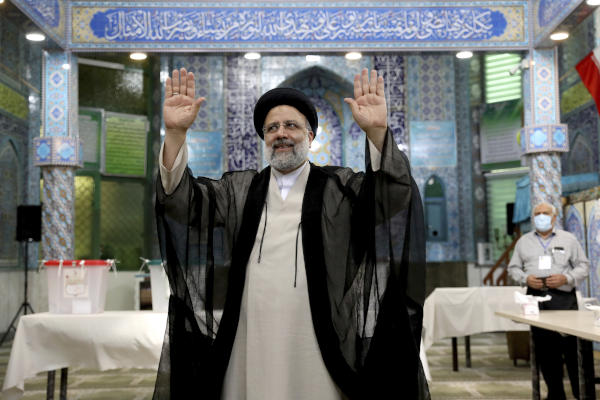
Ebrahim Raisi waves to the media after casting his vote at a polling station in Tehran, Iran Friday, June 18, 2021. AP
Iran’s 2021 presidential elections looked like anything but elections. This was not an election with competition or popular participation but a ceremony for introduction of Mr Ebrahim Raisi. If some people in Iran or the world didn’t know much about him, he will now be all over the news.
As the Iranian political scene is being prepared for Raisi’s presence, what better way to introduce him than sending him to the presidency? Except for the perennial candidate Mohsen Rezayi, the other presidential candidates were barely known to the average people in Iran.
More importantly, forces of permitted politics in Iran (which can be divided to centrist, reformist and conservative) had been mostly dormant in the period running to the elections and most people had already decided not to vote. They barely had much inclination for any of the regime’s factions.
Lack of a belief in the possibility of any sort of change or reform in the political and social structure of the current regime and the feeling of disappointment and hopelessness in society is what led to widespread boycott. But, unbelievable as it was, the regime did nothing to decrease support for an electoral boycott.
The powers knew that popular participation is decreasing and the elections are becoming ceremonial but they still preferred Ebrahim Raisi to ascend to the presidency without much trouble or competition.
This is one big grand show to introduce Raisi, masquerading as a presidential election: Raisi who was a Hojjatoleslam not long ago is now referred to with the higher Shiite clerical rank of an Ayatollah. He is being groomed to replace Ayatollah Khamenei as the Supreme Leader. This is more than electing a president; evidence points to a serious possibility of Raisi vying for the top job.
But even without the succession issue, Raisi is useful since he will make the leadership of the regime more monolithic. Reactionary clerics will now control all the main power axes of the Shiite theocracy.
Having lost all their hopes in the regime, most people are staying home and watching the mostly empty polling station on TV while wondering about their future — and that of Iran.
A glimpse of the future could be already sensed in what Mahmod Vaezi, Rouhani’s chief of staff, said. Speaking to reporters in Jamaran’s Hosseynie, Vaezi said today was a very important day for the four years ahead.
“The talks in Vienna have had good results,” Vaezi said, “and they are going very well. After the elections, important international problems will be solved and people will have better welfare and administration. I am optimistic that, following the elections, we can see solutions to many of the problems caused by economic war and maximum pressure.”
This means that the nuclear deal with the West is to be revived which can lead to release of some of Iran’s blocked assets in foreign banks and perhaps a bit of improvement for the poor in Iran. But there are some questions ignored by Vaezi and other regime officials: Why should the Iranian people be mired in such poverty and daily struggle in the first place? Why should we consider it progress that maybe they’d be able to once more buy a few kilograms of meat or chicken? They have driven the Iranian people to poverty and desperation so that they’d be happy with a bunch of dollars instead of proper welfare and governance.
The truth is that the main problems of Iran are due to lack of proper management and planning and lack of national motivation and patriotic love on part of rulers that have brought ruin to the Iranian people.
Today a man is being sent to the presidential palace who has spent his entire life in the halls of the Judiciary until a few years ago, when he was dispatched to do charity work in preparation for his presidential run.
None of the nominees or those who are doled out top jobs are where they deserve to be. They don’t represent the Iranian people. None of them has anything like the statue expected for president of an honorable country like Iran. It is people like this who’ve made Iran regress. They’ve made our country a place full of corruption, unemployment, falling standards of living, lack of security, deterioration of infrastructure and regional and international isolation. Ebrahim Raisi will not do much for this people. He will be a placeholder for powerful interests of the regime. We don’t know when is the day that he might be called upon to serve as Supreme Leader (i.e. when Khamenei died.) We have to wait and see if this occurs — and to watch the response to it on the part of Iran’s patient yet conscious people.
Meanwhile, Ebrahim Raisi will try to not rock the boat, and perhaps even bring calm to parts of society. He is waiting for bigger days for himself.











